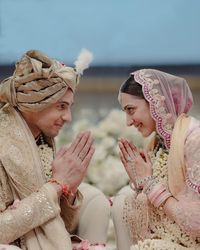It is impossible to scroll Instagram and not see celebrity or influencer wedding pictures or videos. It is almost as if the algorithm had the soul of a wedding planner or vendor wanting to lure you into wedding spends. In the last two weeks we witnessed two Bollywood celebrity weddings on Instagram—Cricketer K.L. Rahul wed actor Athiya Shetty, and actor Sidharth Malhotra wed actor Kiara Advani. Thanks to Instagram, I not only know the band at the Sid-Kiara wedding, but also the mehendiwaali! I also know how the bathrooms at the venue look like. In the west we have seen such breach of privacy and non-consensual publishing of personal images as part of a voyeuristic paparazzi culture result in serious consequences. In India, however, we still consider these the price of being famous.
But, what does such social media generated constant consumption of celebrity lifestyle content, and enforced voyeurism, do to us as spectators? What does it do to our dreams and aspirations for our wedding and what does it do to our expectation from relationships?
I, for one, have had a very clear idea of what my wedding would look like and entail, even when there was no groom, nor any potential groom in sight! I have spent many hours searching destination wedding locations that I know well I can ill-afford; thinking ‘just in case I sign a Hollywood film worth millions of dollars!’ I have been stalking couture collections of various designers for some years now, picking out outfits for my fictional wedding. I may even have spent an extra week or two dating some people who were evidently not the right person for me (nor I for them); but the Instagram couple pictures would look so good; or they would afford the dream destination wedding! Thankfully, good sense prevailed soon enough and everyone moved on. But, it left me wondering what this wedding-obsessed culture of content consumption was doing to our value systems? Do young people today even get a chance to realise that weddings are not merely opportunities to get more likes on social media posts but a commitment to spend your life (till death or divorce do you part) with someone? A wedding is a promise that you will let someone partake of the nitty-gritty and mundane reality and hard decisions of daily life. A wedding is an entry pass that will allow your partner to see you at your worst, most vulnerable, weakest and least attractive moments (and vice versa). Because marriages may be posted but they are not lived out on Instagram.
The social media-fuelled wedding mania has also led to a fundamental shift in our fiscal values. This is a shift that consumer capitalism enabled EMI culture of ‘work hard, spend big’ has already engendered in the millennial generation, but the fantasy wedding craze generates a whole other set of fiscal habits. And, these are not very healthy! The idea that a lavish wedding is a must-do camouflages the reality that (barring jewellery) wedding spends are mostly on expendable items that will be spent and cannot be saved. I remember reading an article in college about how the spate of farmers’ suicides in early 2000s were fuelled by an agrarian culture of large weddings and feasts for the whole village that forced farmers into vicious cycles of bad debt ending in the worst tragedy. At that time I wondered at how or why anyone could make such devastatingly destructive choices. Now, humbled by life, and sheepishly self-aware, I ask myself whether I, too, will be like the poor Indian farmer, landing myself in a cycle of debt at the end of an extravagant wedding?
I decided to do a simple calculation of what this fantasy, Instagram-worthy wedding would cost me. I declared to my father, “If I have the ideal wedding that I want, I will step into married life broke and in debt!”
He chuckled, “Let us hope you pick a partner with better sense than you!”
I will, but wait… what if he, too, gets bitten by the Instagram wedding bug?
The writer is an award-winning Bollywood actor and sometime writer and social commentator.


